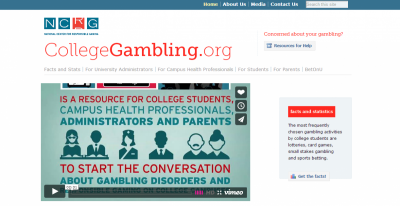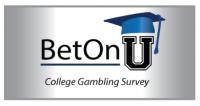NCRG’s College Gambling Awareness Campaign Brings The Issue To Center Court

As the NCAA basketball tournament hits its stride, fans around the nation are filling out brackets and possibly placing bets on the game. While gambling can be fun if you’re of legal age, it’s not a risk-free activity. For some college students, gambling for fun can turn into a serious problem and have a negative impact on their lives.
To help address this issue, the National Center for Responsible Gaming (NCRG) isproud to announcethe launch of its College Gambling Awareness Campaign, bringing new resources towww.CollegeGambling.org. These new and invaluable resources, including the BetOnU College Gambling Survey, a shareable video and an information-packed toolkit, were developed to further help college health professionals and administrators educate students about gambling-related harms and responsible gaming.
‘College health professionals and university administrators should take advantage of these free science-based tools, and even put a link to CollegeGambling.org on their school’s website,’ said Chris Reilly, NCRG senior research director. ‘We’re happy to help students, faculty and fans across the U.S. start the discussion about gambling-related issues on college campuses.’
In 2011, the NCRG introducedCollegeGambling.org, a website designed to help university administrators, campus health professionals, students and parents address these issues using the latest research on college gambling and free resources to incorporate into existing campus-wide education programs.
This year’s College Gambling Awareness Campaign features several new resources on CollegeGambling.org, including:

- BetOnU College Gambling Survey– This brief survey, created by University of Houston researcher Clayton Neighbors, Ph.D. from an NCRG grant, is the first online intervention that allows college students to see how their gambling behavior compares with other students. After taking a 10-minute, confidential survey, participants will receive information on where they stand when compared to others in different universities and colleges. Research suggests that this awareness can help reduce gambling among students. They will also find resources for help, if they are experiencing gambling-related problems. College health professionals and administrators can use the free resource as part of their wellness programs and in student orientations.
- Webinar– On Wednesday, March 19, the NCRG will hold a free webinar, titled “Preventing Disordered Gambling among College Students.” Dr. Clayton Neighbors will discuss the BetOnU College Gambling Screener, provide an overview of disordered gambling on college campuses and describe the research behind the development and testing of this novel prevention program. (Click here to register.)
- The Facts about College Gambling Video– The NCRG created a short video that provides an overview of gambling among college students, gambling disorders, responsible gaming and how college students can get help for a problem. Anyone can download and share this video in education programs.
- College Gambling Toolkit– The NCRG created a toolkit with resources for college health professionals and administrators that includes free, downloadable collateral materials, such as a brochure, an infographic, the BetOnU College Survey and the college gambling video. The toolkit also includes customizable materials for distribution, including sample newspaper articles, newspaper and radio public service announcements, and social media posts.
Stay tuned to Gambling Disorders 360° in the coming weeks for additional information about these new resources and how they can help students, college health professionals and university administrators get involved on their campuses.
NCRG staffICRG NewsBetOnU College Gambling Surveycollege gamblingCollege Gambling Awareness CampaignFacts about College Gambling Video

